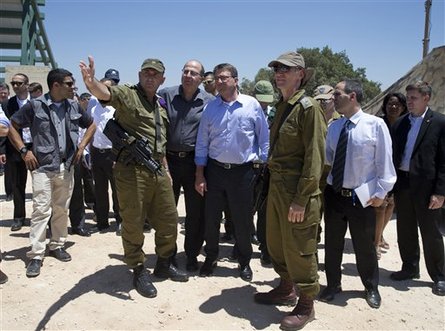Pentagon Chief Tries to Assure Israel over Hizbullah after Iran Deal
Associated Press/Naharnet/21 July/15
On a hilltop lookout near Israel’s border with Lebanon, U.S. Defense Secretary Ash Carter offered personal assurances Monday that the U.S. will help Israel counter Iranian support for Hizbullah. He called it one example of how the U.S. can support the Jewish state in the aftermath of the Iran nuclear deal. Carter visited Hussein Lookout, with a sweeping view of the border as well as the Golan Heights, in an effort to emphasize U.S. concern about a range of threats that face Israel.
These include tens of thousands of short-, medium- and longer-range Hizbullah rockets and missiles in southern Lebanon that could hit Israeli villages and cities. “Hizbullah is sponsored of course by Iran, which is why the United States will continue to help Israel counter Iranian malign influence in the region,” Carter told reporters after receiving an Israeli security briefing in the area.
Carter hit the same theme later at a joint news conference in Tel Aviv with Israeli Defense Minister Moshe Yaalon. They used the appearance to make a public show of unity at a low point in U.S.-Israeli relations heavily strained by Israeli’s opposition to the Iran deal. The agreement, reached between U.S.-led world powers and Iran, puts limits on Iran’s nuclear program in exchange for lifting crippling economic sanctions on the Islamic Republic. Israeli leaders have complained that the deal does nothing to address Iran’s support for hostile anti-Israel groups like Hizbullah in Lebanon and Hamas in the Gaza Strip.
They also say the deal does not have sufficient safeguards to prevent Iran from reaching the capability to make nuclear weapons. Yaalon warmly praised Carter’s track record of support for Israel, while acknowledging the split over the Iran deal. “We greatly disagree when it comes to the agreement with Iran and fear for the future in the aftermath of its signing,” Yaalon said.
“Yet we discuss this issue in a fully open manner, alongside many other issues of great importance.”He called the relationship with the United States a “core pillar” of Israel’s defense, and Carter promised that the Obama administration would not waver from an “ironclad commitment” to ensuring Israel’s military edge in the region. He said that next year Israel will become the first U.S. ally to fly the new U.S. F-35 warplane.
Carter acknowledged tensions over the Iran deal. “Friends can disagree about whether it will work,” he said, “and we will be watching Iran very closely to see. But there’s no disagreement about the ultimate objective. We cannot let Iran have nuclear weapons. And there’s no disagreement about the threats Israel sees every day from Iran’s destabilizing activities, from terrorists like Hizbullah and Hamas and (the Islamic State group.)”Carter said Israel can count on the U.S. to do whatever is necessary to ensure its security, and he ticked off a list of areas in which the two countries are cooperating, including missile defense. “If more is needed in the future, then we will do more,” he said.
Yaalon said he sees no way Syria can be pieced back together after the chaos of four years of civil war that have drawn numerous extremists groups inside its borders, including the Islamic State.
“Chronic instability is going to characterize Syria for quite a long time,” he said, adding that Israel is not taking sides there but is determined to act in the event it sees the introduction of chemical weapons or transfers of certain weapons to Hizbullah from Iran. Since the civil war started in 2011, Israel is believed to have carried out a number of airstrikes on suspected shipments of advanced missiles believed to be intended for Hizbullah.
Yaalon suggested that more will, indeed, be required. He said Israel believes Iran will be strengthened by the nuclear deal, and that Iranian proxies like Hizbullah “are going to get more money” as a result.
He also said the civil war in Syria adds to instability on Israel’s borders. Carter is to meet Tuesday with Prime Minister Benjamin Netanyahu, who has called the Iran deal a mistake of historic proportions. Afterward the U.S. defense chief will fly to Jordan to consult with government officials there and visit a base used in the war against the Islamic State group.



















